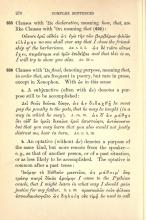632. Ὡς (as, how) and ὥς (thus, so) are adverbs of manner from ὅς (§ 339); they differ only in accent, ὥς corresponding to the older demonstrative form of ὅς, and ὡς to the relative form; sometimes ὡς itself is accented (§§ 18 and 21.c). The uses of ὡς as a subordinating conjunction fall under two classes:
1. Corresponding to those of ὅς and other relative pronouns
2.Showing farther developments in special directions
633. Ὡς (as, how, in which way) corresponds closely to ὅς in meaning, and introduces clauses like ὅς clauses; most of them are like simple sentences (§ 615), but some have the subjunctive and optative in the manner described in § 616.a & b.
a. As purely relative, in comparisons, often in the strengthened form ὥσπερ. Though a conjunction, ὡς retains the force of an adverb in its own clause.
Ἐκέλευσε τοὺς Ἕλληνας, ὡς νόμος αὐτοῖς εἰς μάχην, οὕτω ταχθῆναι καὶ στῆναι.
He directed the Greeks, as was their custom for battle, so to arrange themselves and take position.
Xen. Anabasis 1.2.15
θᾶττον ἢ ὡς ἂν ᾤετο
more quickly than (as) one would have thought
Xen. Anabasis 1.5.8
ὡς ὁ τάδε πορὼν ὄλοιτο
as may he that wrought this perish
Soph. Electra 126
Often the antecedent is a sentence or phrase.
ὡς μὲν τοῖς πλείστοις ἐδόκουν, φιλοτιμηθέντες, ὅτι κτλ.
being jealous, as they appeared to the majority, because, etc.
Xen. Anabasis 1.4.7
So ὡς ἐλέγετο (as was said), ὡς ἀκούω (as I hear), and many like expressions.
b. As indirect interrogative.
Ἀπήγγειλε τὴν κρίσιν Ὀρόντᾱ, ὡς ἐγἐνετο.
He reported the trial of Orontes, how it was conducted.
Xen. Anabasis 1.6.5
ἄκουσον ὡς ἐρῶ.
Hear how I shall tell it.
Soph. Oedipus the King 547
οἶσθʼ ὡς ποίησον;
Do you know how you should do? (literally, do you know how do?)
Soph. Oedipus the King 543
In this use also ὡς retains its force as adverb.
c. Temporal.
Ὁ δʼ ὡς ἀπῆλθε βουλεύεται.
But he, as he went away, considered.
Xen. Anabasis 1.1.4
ὡς εἶδε Κλέαρχον διελαύνοντα, ῑ̔́ησι τῇ ἀξίνῃ.
When he saw Klearchos riding through, he threw his ax at him.
Xen. Anabasis 1.5.12
d. Causal.
Δέομαι σοῦ παραμεῖναι ἡμῖν, ὡς ἐγὼ οὐδʼ ἂν ἑνὸς ἥδῖον ἀκούσαιμι.
I beg you to stay with us, as there is not one whom I would more gladly hear.
Plato Protagoras 335d
e. Such clauses, like those introduced by ὅς and ἐπεί (§ 629.a), are often so loosely connected with the main verb as to be really independent sentences.
f. Some common phrases have arisen from the omission of a verb. Thus clauses like ὡς μάλιστα ἐδύνατο (as he was most able ; Xen. Anabasis 1.1.6), and ὡς ἂν δύνωμαι διʼ ἐλαχίστων (in as brief terms as I can; Lysias 12.3), are abbreviated to ὡς μάλιστα and ὡς διʼ ἐλαχίστων. In this way ὡς becomes merely a means of strengthening a superlative: ὡς βέλτιστος (as good as possible).
634. Two special uses of ὡς have been developed from the relative meaning (§ 633.a, above). These are
1. the declarative
2. the final, denoting purpose
635. Clauses with Ὥς declarative, meaning how, that, are like clauses with Ὅτι meaning that (§ 622).
Oὔποτε ἐρεῖ οὐδεὶς ὡς ἐγὼ τὴν τῶν βαρβάρων φιλίᾱν εἱλόμην.
No one shall ever say that I chose the friendship of the barbarians.
Xen. Anabasis 1.3.5
ὡς δὲ τοῦτο οὕτως ἔχει, πειρᾱ́σομαι καὶ ῡ̔μῖν ἐπιδεῖξαι.
And that this is so, I will try to show you also.
Plato Apology 24c
636. Clauses with Ὡς final, denoting purpose, meaning that, in order that, are frequent in poetry, but rare in prose, except in Xenophon. With ὡς in this sense
a. A subjunctive (often with ἄν) denotes a purpose still to be accomplished.
Δεῖ θεοῖς δοῦναι δίκην, ὡς ἂν διδαχθῇ.
He must pay the penalty to the gods, that he may be taught (in a way in which he may).
Aesch. Prometheus Bound 9–10
ὡς δʼ ἂν μάθῃς ὅτι οὐδʼ ἂν ῡ̔μεῖς δικαίως ἐμοὶ ἀπιστοίητε, ἀντάκουσον.
But that you may learn that you also would not justly distrust me, hear in turn.
Xen. Anabasis 2.5.16
b. An optative (without ἄν) denotes a purpose of the same kind, but more remote from the speaker—e.g., as that of another person, or of a past situation, or as less likely to be accomplished. The optative is common after a past tense.
Ἱ̄κόμην τὸ Πῡθικὸν μαντεῖον, ὡς μάθοιμʼ ὅτῳ τρόπῳ πατρὶ δίκᾱς ἀροίμην.
I came to the Pythian oracle, that I might learn in what way I should gain justice for my father.
Soph. Electra 32–34
προσκαλῶν τοὺς φίλους ἐσπουδαιολογεῖτο ὡς δηλοίη οὕς τῑμᾷ.
He used to call his friends and talk seriously with them, so as to show whom he honored.
Xen. Anabasis 1.9.28
c. A past tense of the indicative (imperfect, aorist, pluperfect) marks the purpose as unattainable, part of an imaginary, unreal situation expressed or implied in the leading clause.
Εἰ γάρ μʼ ὑπὸ γῆν ἧκεν, ὡς μήτε θεὸς μήτε τις ἄλλος τοῖσδʼ ἐπεγήθει.
Oh that he had sent me under the earth, that neither god nor any other creature might be rejoicing at this.
Aesch. Prometheus Bound 152–157
τί μʼ οὐ λαβὼν ἔκτεινας, ὡς ἔδειξα μήποτε ἐμαυτὸν ἀνθρώποισιν;
Why did you not take and slay me, that I might never have shown myself to men?
Soph. Oedipus the King 1391–1392
d. For ὡς with a participle see § 593.c. For ὡς with an infinitive see § 566.
637. Ὥσπερ is a strengthened ὡς, used only in a relative and comparative sense—even as, just as. Ὥσπερ clauses are therefore like simple sentences.
Ὥσπερ ἵππος εὐγενὴς ἐν τοῖσι δεινοῖς θῡμὸν οὐκ ἀπώλεσεν, ὡσαύτως δὲ σὺ ἡμᾶς ὀτρῡ́νεις.
Even as a horse of noble blood does not lose heart (§ 465) in danger, so thou dost spur us on.
Soph. Electra 25-28




